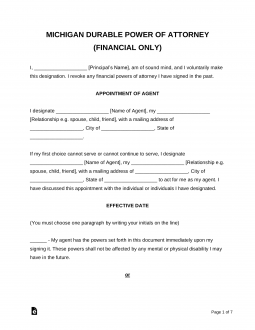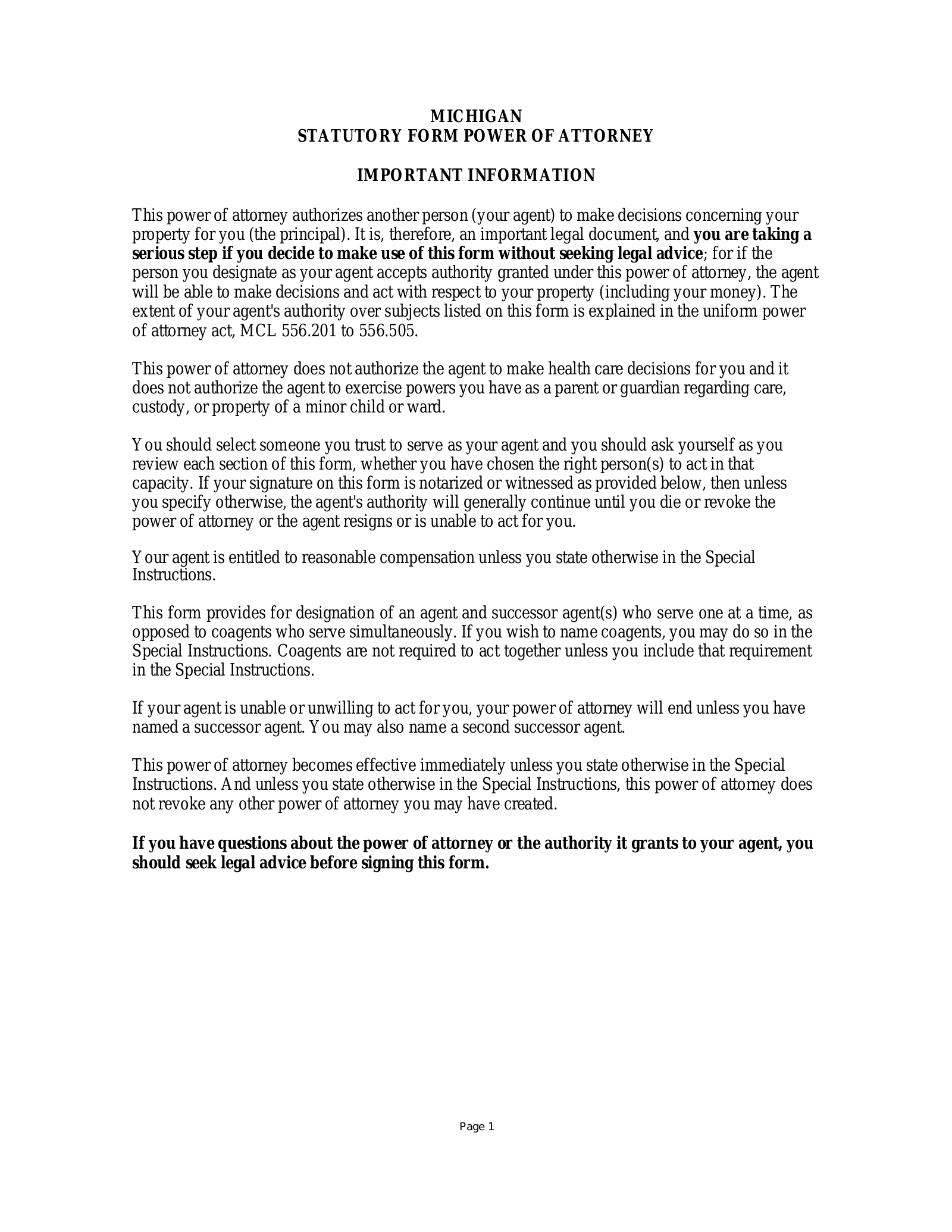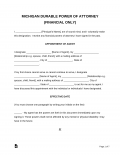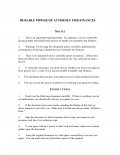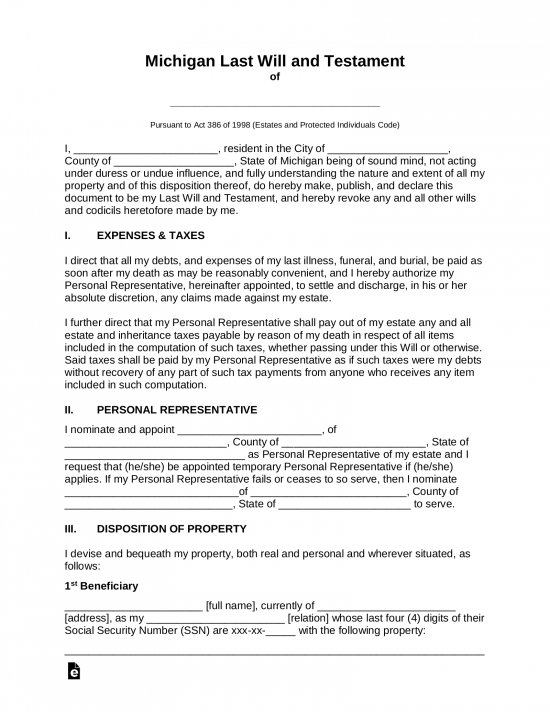Updated August 11, 2023
A Michigan durable power of attorney is a form that allows a person (“principal”) to select someone else (“agent”) to handle some or all facets of their finances. This is common for anyone who is seeking to have someone else take care of their business and financial decisions if they should become incapacitated or not able to handle themselves (“durable”). The person selected can be any one of the principal’s choice but is recommended to be a spouse or trusted family member.
Versions (2)
Download: PDF, MS Word, OpenDocument
Download: PDF
Table of Contents |
Laws
Definition of “Durable”
A durable power of attorney is a power of attorney by which a principal designates another as the principal’s attorney-in-fact in a writing that contains the words “This power of attorney is not affected by the principal’s subsequent disability or incapacity, or by the lapse of time”, or “This power of attorney is effective upon the disability or incapacity of the principal”, or similar words showing the principal’s intent that the authority conferred is exercisable notwithstanding the principal’s subsequent disability or incapacity and, unless the power states a termination time, notwithstanding the lapse of time since the execution of the instrument (§700.5501(1))
Definition of “Power of Attorney”
The Michigan Compiled Laws do not define “power of attorney” but do provide a nonexclusive list of its powers at §700.5501(3).
Signing Requirements
Two (2) witnesses or a notary public. The agent is required to sign the last page of the power of attorney titled the Acknowledgment of Responsibilities by Attorney-in-Fact (§ 700-5501(2), (§ 700-5501(4))
Statutory Form
The Michigan Compiled Laws do not include a sample statutory form for a durable power of attorney
How to Write
Download: PDF, MS Word, OpenDocument
1 – The Paperwork For A Michigan Appointment Of Principal Power Should Be Downloaded
The Michigan document to delegate a Principal’s authority, so an Attorney-in-Fact may properly represent him or her, can be previewed in the image on this page then downloaded using the buttons or links labeled “PDF,” “Word,” or “ODT.”
2 – Supplement The Language In The Initial Declaration Statements With Information
The first paragraph of this document will serve to verify the identity of the Principal as well as his or her ability to delegate principal authority to the Attorney-in-Fact we will name below. Locate the first blank line in this statement (labeled “Principal’s Name”) then supply the Principal’s first, middle, and last name to this space. If the Principal has any suffixes or titles (i.e. Dr., Ph.D., etc.) that are considered part of his or her name, this should be presented as well.  The area titled “Appointment Of Agent” will function to identify the second party in this document. This is the individual who the Principal has decided to act in his or her name in the manner defined in this document. The first blank line in this area will require the full name of the Attorney-in-Fact (as it appears on his or her I.D. cards).
The area titled “Appointment Of Agent” will function to identify the second party in this document. This is the individual who the Principal has decided to act in his or her name in the manner defined in this document. The first blank line in this area will require the full name of the Attorney-in-Fact (as it appears on his or her I.D. cards).  This report will continue with a description of the relationship the Principal holds with the Attorney-in-Fact we just named. Supply this description to the second blank line.
This report will continue with a description of the relationship the Principal holds with the Attorney-in-Fact we just named. Supply this description to the second blank line.  Locate the last three blank lines in this statement. Use this area to record the Attorney-in-Fact’s mailing address by entering the street address, city, and state where he or she receives mail.
Locate the last three blank lines in this statement. Use this area to record the Attorney-in-Fact’s mailing address by entering the street address, city, and state where he or she receives mail.  At times, the Attorney-in-Fact we named above cannot or will not use the authority granted here on behalf of the Principal. If so, the Principal may need an additional party to step in immediately to carry out his or her directives. This can be set to occur automatically when the Attorney-in-Fact above is unable to represent the Principal if we satisfy the requirements of the next statement in this section. Locate the statement beginning with the words “If My First Choice Cannot Serve Or Cannot Continue…” then, enter this back-up Agent’s full name, relationship to the Principal, and his or her mailing address on the blank lines provided.
At times, the Attorney-in-Fact we named above cannot or will not use the authority granted here on behalf of the Principal. If so, the Principal may need an additional party to step in immediately to carry out his or her directives. This can be set to occur automatically when the Attorney-in-Fact above is unable to represent the Principal if we satisfy the requirements of the next statement in this section. Locate the statement beginning with the words “If My First Choice Cannot Serve Or Cannot Continue…” then, enter this back-up Agent’s full name, relationship to the Principal, and his or her mailing address on the blank lines provided. 
3 – Report When The Agent’s Use Of Power Is Authorized By The Principal
The section labeled “Effective Date,” will require the participation of the Principal. He or she must read the two statements presented here then initial the blank line that precedes the most appropriate description of when the Attorney-in-Fact should be enabled to use principal power to represent the Principal in his or her affairs. If the Attorney-in-Fact will be able and expected to wield principal authority as soon as this document is executed, then the first statement must be initialed. If the Principal only wants principal authority delivered when he or she is incapacitated, then the second statement must bear the Principal’s initials. Both statements will provide that the Principal Power granted to the Agent will remain in place regardless of the Principal’s health, wellbeing, or ability to communicate. 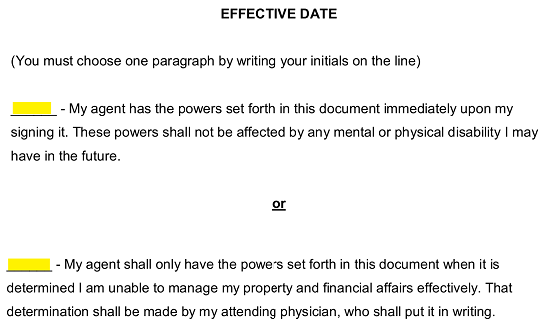
4 – Document The Powers Approved For The Agent’s Representation Of The Principal
The area labeled “Powers” will attempt to document how the Principal expects the Attorney-in-Fact to behave when representing him or her. This section will require the Principal to determine which powers he or she intends to grant the Attorney-in-Fact, read each statement presented, then initial the blank space before every statement that describes the powers, he or she wishes to grant the Attorney-in-Fact.  The Principal should initial the first blank space (located just before the label “Banking”) if he or she intends to grant the Attorney-in-Fact the right to handle his or her affairs with financial institutions. This will give the Attorney-in-Fact the ability to carry out all the actions defined in this paragraph, including access to the Principal’s safe deposit box.
The Principal should initial the first blank space (located just before the label “Banking”) if he or she intends to grant the Attorney-in-Fact the right to handle his or her affairs with financial institutions. This will give the Attorney-in-Fact the ability to carry out all the actions defined in this paragraph, including access to the Principal’s safe deposit box.  If the Attorney-in-Fact should have the authority to apply for and receive “Government Benefits” on behalf of the Principal, then the Principal should initial the blank line attached to the second paragraph.
If the Attorney-in-Fact should have the authority to apply for and receive “Government Benefits” on behalf of the Principal, then the Principal should initial the blank line attached to the second paragraph.  The Attorney-in-Fact can be granted the authority to invest, reinvest, and withdraw funds with the Principal’s “Investments,” if the Principal initials the third paragraph.
The Attorney-in-Fact can be granted the authority to invest, reinvest, and withdraw funds with the Principal’s “Investments,” if the Principal initials the third paragraph.  The Principal can grant the power to make decisions and take actions regarding his or her retirement plans by initialing the fourth statement (labeled “Retirement Plan”). It should be noted the language here does not allow the Attorney-in-Fact to make changes to the beneficiary of the Principal’s retirement plans or IRA.
The Principal can grant the power to make decisions and take actions regarding his or her retirement plans by initialing the fourth statement (labeled “Retirement Plan”). It should be noted the language here does not allow the Attorney-in-Fact to make changes to the beneficiary of the Principal’s retirement plans or IRA.  If the Principal requires the Attorney-in-Fact to handle his or her tax returns, tax payments, tax assessments, etc. then he or she must initial the blank space corresponding to”Taxes” paragraph. Keep in mind, this document will not necessarily satisfy all the requirements of a tax entity. In many cases, a tax entity will have its own paperwork the Principal must submit to name an Attorney-in-Fact as his or her representative.
If the Principal requires the Attorney-in-Fact to handle his or her tax returns, tax payments, tax assessments, etc. then he or she must initial the blank space corresponding to”Taxes” paragraph. Keep in mind, this document will not necessarily satisfy all the requirements of a tax entity. In many cases, a tax entity will have its own paperwork the Principal must submit to name an Attorney-in-Fact as his or her representative.  The Principal’s “Insurance” matters can be decided upon and acted on by the Attorney-in-Fact with principal authority once the Principal initials the “Insurance” Paragraph.
The Principal’s “Insurance” matters can be decided upon and acted on by the Attorney-in-Fact with principal authority once the Principal initials the “Insurance” Paragraph.  If the Attorney-in-Fact will be expected to handle the Principal’s property interests by buying, selling, leasing, repairing, and maintaining a real property, the “Real Estate” statement must be initialed by the Principal.
If the Attorney-in-Fact will be expected to handle the Principal’s property interests by buying, selling, leasing, repairing, and maintaining a real property, the “Real Estate” statement must be initialed by the Principal.  The Principal grant the authority the Attorney-in-Fact requires to handle the “Personal Property” of the Principal by initialing the blank line corresponding to the eighth paragraph.
The Principal grant the authority the Attorney-in-Fact requires to handle the “Personal Property” of the Principal by initialing the blank line corresponding to the eighth paragraph.  The next paragraph, labeled “Legal Advice And Proceedings,” will allow the Attorney-in-Fact to seek and hire legal professionals (i.e. criminal attorneys, tax attorneys, etc.) to handle the Principal’s affairs once the Principal initials the ninth statement. This type of power will also allow the agent to “…Initiate Or Defend” the Principal during legal proceedings as well as administrative proceedings.
The next paragraph, labeled “Legal Advice And Proceedings,” will allow the Attorney-in-Fact to seek and hire legal professionals (i.e. criminal attorneys, tax attorneys, etc.) to handle the Principal’s affairs once the Principal initials the ninth statement. This type of power will also allow the agent to “…Initiate Or Defend” the Principal during legal proceedings as well as administrative proceedings.  If the Principal has an “Estate Plan” that the Attorney-in-Fact should access and review as a consideration when developing a strategy to represent the Principal, then the last paragraph in this list will need to be initialed by the Principal.
If the Principal has an “Estate Plan” that the Attorney-in-Fact should access and review as a consideration when developing a strategy to represent the Principal, then the last paragraph in this list will need to be initialed by the Principal.  In some cases, the Principal may wish to apply certain provisions, conditions, tasks, limitations, or extensions to the authority he or she is delivering to the Attorney-in-Fact. If so, then all such directives should be entered to the blank lines in the section titled “Special Instructions.”
In some cases, the Principal may wish to apply certain provisions, conditions, tasks, limitations, or extensions to the authority he or she is delivering to the Attorney-in-Fact. If so, then all such directives should be entered to the blank lines in the section titled “Special Instructions.” 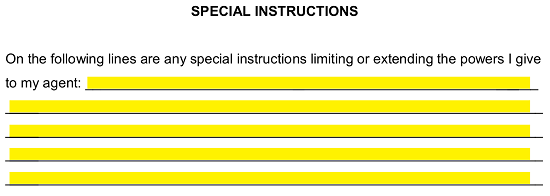 The “Other Provisions” section of this document will address some additional issues that often concern an Attorney-in-Fact’s representation of a Principal. It is strongly recommended that both parties are well familiar with this section.
The “Other Provisions” section of this document will address some additional issues that often concern an Attorney-in-Fact’s representation of a Principal. It is strongly recommended that both parties are well familiar with this section. 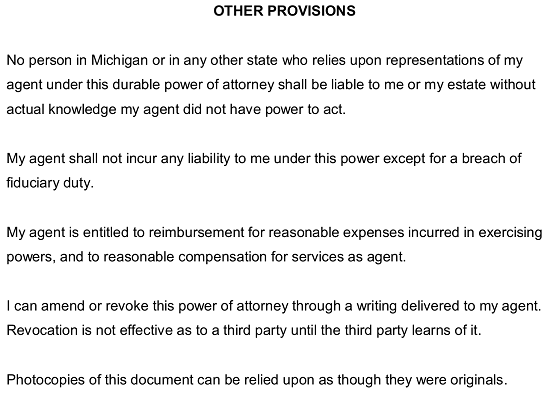
5 – The Principal And Several Parties Must Gather To Execute This Appointment Of Power
The Principal will be required to provide a dated and valid signature to this document so that it can be executed as an approved representation of his or her intentions. In order for this signing to be considered valid, the Principal must sign this paperwork in the presence of two Witnesses or a commissioned Notary Public. Once these parties have coordinated, the Principal must locate the “Signature Of Principal” section, enter the current date (month name, two-digit calendar day, two-digit calendar year) to the area labeled “Dated,” sign his or her name on the blank line labeled “Principal Signature,” and print his or her name on the adjacent blank space (labeled “Print Name”). 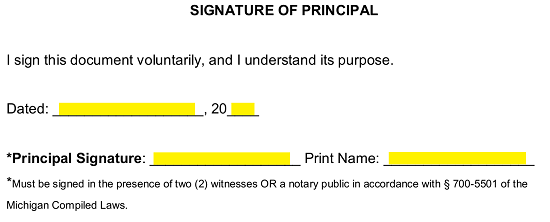 Next, the Attorney-in-Fact must also provide a statement that acknowledges this delegation of the Principal’s authority and accepts the responsibility of his or her role. This task will be taken care of in the section titled “Acknowledgment Of Responsibilities By Attorney-in-Fact.” To begin, present the Attorney-in-Fact’s full name to the blank line attached to the phrase “Have Been Appointed…” and the Principal’s name to the second blank line of the same statement. Make sure both names appear identical to the way they are reported at the beginning of this paperwork.
Next, the Attorney-in-Fact must also provide a statement that acknowledges this delegation of the Principal’s authority and accepts the responsibility of his or her role. This task will be taken care of in the section titled “Acknowledgment Of Responsibilities By Attorney-in-Fact.” To begin, present the Attorney-in-Fact’s full name to the blank line attached to the phrase “Have Been Appointed…” and the Principal’s name to the second blank line of the same statement. Make sure both names appear identical to the way they are reported at the beginning of this paperwork.  Document the Principal’s signature date (to the power document above) using the next two blank spaces.
Document the Principal’s signature date (to the power document above) using the next two blank spaces.  Once the Attorney-in-Fact has read the above power appointment and this acknowledgment statement, he or she must sign the “Attorney-in-Fact Signature” line, print his or her name on the blank line labeled “Attorney-in-Fact” beneath the signature line, and supply the current date as his or her signature date on the blank line labeled “Date.”
Once the Attorney-in-Fact has read the above power appointment and this acknowledgment statement, he or she must sign the “Attorney-in-Fact Signature” line, print his or her name on the blank line labeled “Attorney-in-Fact” beneath the signature line, and supply the current date as his or her signature date on the blank line labeled “Date.”  Both the Witnesses who have gathered to view the Principal’s act of signing must read the “Statement And Signature Of Witnesses” area then supply a signature. Each one must sign a unique “Witness Signature” line, enter the “Date” of this signature, print his or her name on the “Print Name” line, and supply his or her mailing address on the blank line labeled “Address.” Two identical signature areas have been included so that each Witness can work in a distinct space.
Both the Witnesses who have gathered to view the Principal’s act of signing must read the “Statement And Signature Of Witnesses” area then supply a signature. Each one must sign a unique “Witness Signature” line, enter the “Date” of this signature, print his or her name on the “Print Name” line, and supply his or her mailing address on the blank line labeled “Address.” Two identical signature areas have been included so that each Witness can work in a distinct space. 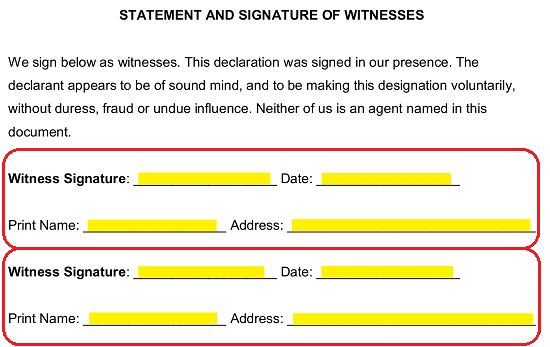 The final page, “Notary Acknowledgment,” can only be filled out once the attending Notary Public has been satisfied by the Principal’s signing and wishes to notarize the event. This page will allow him or her to verify the location, date, parties in attendance, and supply the items required for notarization.
The final page, “Notary Acknowledgment,” can only be filled out once the attending Notary Public has been satisfied by the Principal’s signing and wishes to notarize the event. This page will allow him or her to verify the location, date, parties in attendance, and supply the items required for notarization. 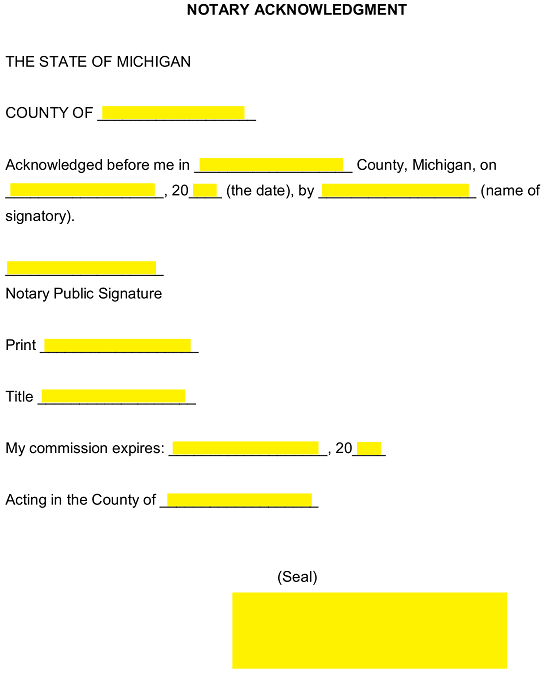
Related Forms
Download: PDF
Download: PDF, MS Word, OpenDocument

